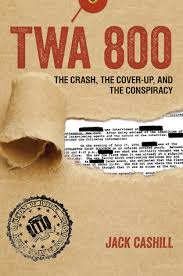The Big Lie in Jay-Z’s Trayvon Series: Part IV
Jack Cashill's Big Lie in Jay-Z's Trayvon Series:
![]()

Order Jack Cashill's latest book, TWA 800: The Crash, the Cover-Up, and the Conspiracy
![]()

About Silenced: Flight 800
and the Subversion
of Justice (DVD) -
-Buy the Silenced DVD-
![]()
© Jack Cashill
August 29, 2018 - WND.com
There is so much recklessly and carelessly wrong with Shawn “Jay-Z” Carter’s six-part documentary series, “Rest in Power: The Trayvon Martin Story” that it is never easy to determine each episode’s most egregious lie.
For carelessness in part 4, it is hard to top the image that closes the episode. We hear the voice of Martin’s mother Sybrina Fulton say, “I thought long and hard about that night.”
This voice plays over a nighttime scene from the area in which Martin was shot. Superimposed over that image is the notation, “February 6, 2012.”
When I saw this, I backed up to make sure I read it correctly. I had--“February 6, 2012.” Well, Martin was killed on February 26, 2012. You would think someone would catch an error that basic.
The producers are stunningly indifferent to facts. At least 90 percent of the talking heads interviewed for the show are sympathetic to Martin. At least 90 percent of those have no idea what they are talking about.
This cluelessness inspired a short segment criticizing the prosecutors because “they didn’t show who Trayvon was.” His former football coach and his aviation teacher, in particular, sang Martin’s praises. “He was a carbon copy of me,” fumed the black aviation teacher.
Martin may have once been a carbon copy of the teacher, but neither the teacher nor the coach knew the Trayvon Martin who attacked George Zimmerman.
In the last years of his young life, Martin was being shuttled between one house and another—his mother’s, his father’s, his uncle’s, his father’s girlfriend.
The reason Trayvon ended up in limbo those last two years of his life was because he lost the one place he called home, the house where he had spent the majority of his of time from the age of three until the age of fifteen, the home of Alicia Stanley, Tracy Martin’s second wife and Trayvon’s stepmother.
When Tracy left Alicia for his new girlfriend, Brandy Green, Trayvon was fifteen. It was at this time that Trayvon began to fall apart, and there was no one readily available to put the pieces back together.
In “Rest in Power” the producers do not so much as mention Stanley. Almost no one in the media did when the story was in the news.
“I'm here with you to let people know that I exist,” Stanley told CNN’s Anderson Cooper during the run-up to the trial. “And I would not sit back anymore and take the lies that's out there being told. I'm the one that went to them football games. I'm the one that was there when he was sick.”
The producers of “Rest in Power” have edited Stanley’s life out of the narrative. That is no surprise. The news media did the same during the trial. Team Trayvon’s relentless propaganda campaign worked much better with just one grieving mom and dad representing the fallen son.
At the time of his death, everyone claimed to know Trayvon, but no one really did, not even Alicia Stanley. She thought it impossible Trayvon would start a fight. “He's not what the media make him out to be,” Stanley told Cooper, “this thug.”
In reality, Martin was well on the road to thugdom. He hadn’t played football in years. His grades had tanked. His behavior had deteriorated. As Fulton knew, Martin had not passed the FCAT, Florida's major standardized test, the without which not of graduation.
On March 26, just days after Barack Obama’s “If I had a son” manifesto, the Miami Herald dug a little deeper. It published a piece whose very title—“Multiple suspensions paint complicated portrait of Trayvon Martin”--should have caused the other media to put a brake on Martin’s canonization.
The A and B student of those first weeks post-shooting who “majored in cheerfulness“ had apparently been suspended three times during the current school year and “had a spotty school record.”
The most troubling of those suspensions was handed down in October 2011, four months before Martin’s death. Martin was seen in an “authorized area,” but that wasn’t the half of it.
A school police officer saw him in that area “hiding and being suspicious.” There he had written “WTF” on a locker.
The next day the officer rifled through Martin’s book bag looking for the offending marker and found something more interesting: twelve pieces of women’s jewelry, a watch and a large flathead screwdriver that the officer described as a “burglary tool.”
In February, Martin was suspended for the third time, on this occasion for carrying a plastic bag with marijuana residue and a marijuana pipe.
When Zimmerman first saw Martin, he told the dispatcher, “This guy looks like he’s up to no good or he’s on drugs or something. It’s raining and he’s just walking around looking about.”
Given Martin’s school record and the fact that the police found a burglary tool near the body, Zimmerman was likely right on all counts.
Most of this information was kept from the jury. Had the prosecution introduced character witnesses the way the talking heads insisted they should, this all could have come out.
And maybe if it had, we would have been spared the unseemly propaganda of “Rest in Power.”
____
____
Jack Cashill's Big Lie in Jay-Z's Trayvon Series:

Jack Cashill is the author of If I Had A Son: Race, Guns, and the Railroading of George Zimmerman.
